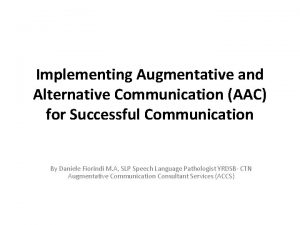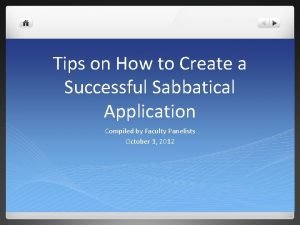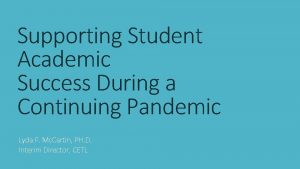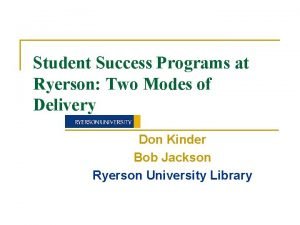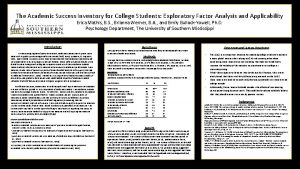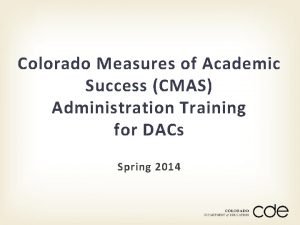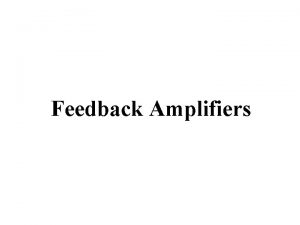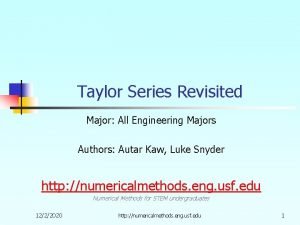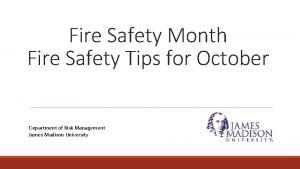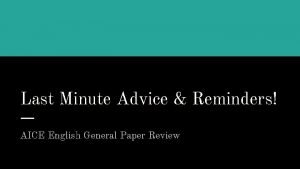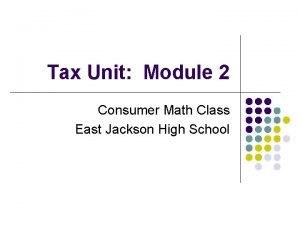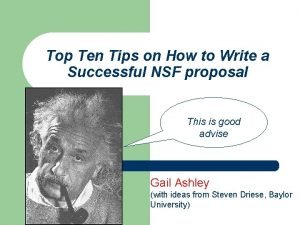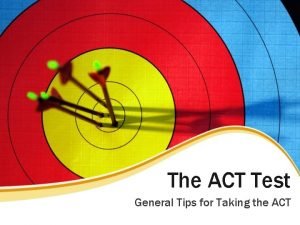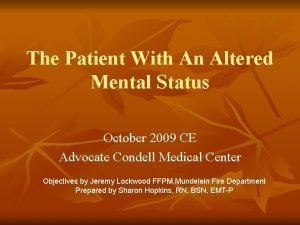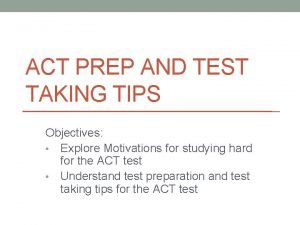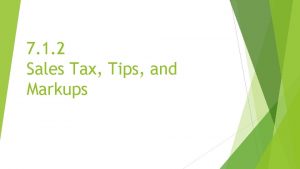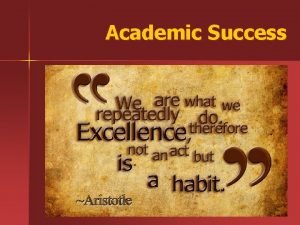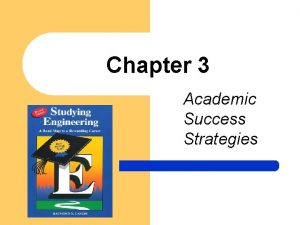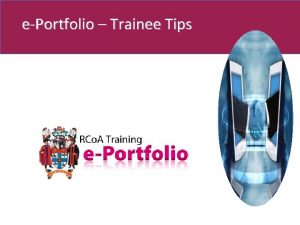Academic Success Tips Series What is an Academic













































- Slides: 45

Academic Success Tips Series

What is an Academic Success Coach? • Your link to faculty, campus resources, and serves as your partner in success • There to: § To ask a question (about anything!) § To talk about your current semester/future semesters § To seek guidance if you’re struggling in a class (especially to avoid falling out of sequence) § To problem solve/brainstorm a solution for an issue § To chat/vent/take a quick break, etc. 2

Academic Strategies 3

Time Management 4

What is TM and why do I need to utilize it? • Time Management is the act or practice of managing and supervising time. • Needed to: § § § Save time Reduce stress Function effectively Increase productivity To have more control of your life! 5

Why is this important? • First semester is paramount to your success in nursing school. • 18 credit hour course load—(12 is the standard full time credit hour) • Rule: For each credit hour of class, 3 hours of studying a week. • How much? 54 hours a week. Only 168 hours in a week total. Semester I Credits NSG 129 Concepts & Connections (1 st 1 8 weeks) NSG 201 Health Assessment & Communication (1 st 8 weeks) 4 NSG 241 Fundamentals of Nursing (2 nd 8 weeks) 4 NSG 221 Community Concepts 2 NSG 251 Pharmacology w/Lab 4 NSG 211 Pathophysiology 3 Total 18 6

The process of TM • Plan • Prioritize • Schedule • Goal Set • Rinse and Repeat 7

How do I become organized? • Use a planner § Make note of your daily class schedule and all important dates § For example, assignment due dates and exam dates § Note any activities you have planned • Know your limits § Plan your study breaks and downtime § Build in time for meals, exercise, etc. 8

Semester Schedule Example 9

Weekly Assignment Schedule Example Week One 8/21 -8/25 Modules to Have Done Homework to Do/Due Date Modules within Test NSG 129 1 and 2 1 -4; 9/18 NSG 201 -100 1 Image Discussion 8/23 Nurse Interview 8/25 Patterns of Knowing Dis. 8/25 NSG 201 -101 Labs 1 and 2 NSG 211 1 NSG 221 1 NSG 251 -100 1 NSG 251 -101 Lab 1 1 -4; 9/7 1 -5; 9/15 IHI Intro to Pop. Health 8/25 1 -6; 10/10 1 -3; 9/13 10

How do I avoid Procrastination? • Break down larger tasks into smaller steps • Spread work out over several days • Pace yourself • Study/review every day to avoid cramming • Turn in all assignments on time § Do the extra credit § Get participation credit 11

How do I manage my time? • Create a time management plan § § Get into a good routine and stick with your schedule Get up each day as if you going to work Dress the part, wear your scrubs Make room for relaxation. Too much studying is not the key and not enough studying is a problem as well • Budget your time well 12

Daily Time Management Log Example 13

Effective Study Strategies for Nursing Adapted from Marj Batic, Director of Academic Support Services 14

Ask yourself… • What are my previous habits in other degreed program? • Will I use the same methods in nursing? • What could interfere with studying? • What is my support system like? 15

Studying Dos and Don’ts • Don’t overstudy • Utilize: Lecture & Powerpoints, supplementing with the textbook • Do take Breaks • Do use ‘Step Approach’ • Use all sensory modalities to study • Use all styles to enhance learning • The more ways information gets into the brain, the better • Students must “get noisy” 16

Study Tips • Pay Attention • Auditory Techniques • Recite material • Mnemonics • Visual Techniques • • Flash Cards Visualization Reading text Color Coding/highlighting g Enhancing Retention 14% hearing 22% seeing 30% watching 42% repeating 72% visualizing 83% performing 92% teaching 17

How do I ascertain my learning style? • Knowing one’s learning style can help improve learning and memory • The styles are auditory, visual and kinesthetic/tactile § http: //vark-learn. com/the-vark-questionnaire/ 18

How do I learn best? • Auditory learners learn best when information is presented orally § Study groups and talking out loud will help to retain information • Visual learners learn best from seeing things § You. Tube videos, diagrams, charts and pictures are learning aids • Kinesthetic/tactile learners learn best from a hands-on learning approach § These students learn by doing, touching, and experiencing things 19

What if I have more than one learning style? • Multimodal learners § Identify with more than one learning style 20

Test Anxiety Adapted from Beth Tidball, Director of Academic Advising 21

Test Anxiety • Anxiety during testing situations is normal and can be beneficial • Test anxiety becomes a problem when a student is so anxious performance suffers • Test anxiety must be associated with a DSM diagnosis in order to receive academic accommodations • Often caused by fear of failure, lack of confidence, and inadequate study skills • Improving study skills may build confidence and lessen anxiety in testing situations 22

Common Symptoms • Physical • Headaches, nausea, sweating, dry mouth • Emotional • Fear, anger, depression • Behavioral • Fidgeting, pacing, avoidance • Cognitive • Going blank, difficulty concentrating 23

Coping with Test Anxiety: Before the Exam • Develop good study habits • Visualize yourself doing well • Get plenty of rest the night before • Don’t consume caffeine before the exam • Get to testing room on time • Remember finishing first doesn’t equal mastery • See a counselor • Request ADA accommodations with appropriate diagnosis/documentation 24

Coping with Test Anxiety: During the Exam • Sit in the front row • Don’t talk to other students immediately before the test • Read the questions twice • Do a data dump on the back of the exam/scrap piece of paper before you start the exam (once proctor begins exam) • Ask the proctor if you have a question during the exam • Do the questions/problems you know first • Go back over exam before you turn in—did you skip anything? • Don’t change an answer unless you are 100% certain it is wrong 25

Questions & Comments 26

Test Taking Skills Adapted from Rutgers University School of Nursing Tips 27

Fundamentals of Test Taking • DO NOT CRAM • Be well rested • Be confident • Read each question carefully • Answer ONLY what is being asked; do not read into the question • Pace yourself • Make sure you answer all the questions • Don’t change your answer UNLESS you are 100% the answer is correct 28

Five Cognitive Levels & Preparing for Nursing Exams 1. Remembering 2. Understanding 3. Applying 4. Analyzing 5. Evaluating Ex Example: Studying Medication- Furosemide 1. Memorize the classification 2. Develop an understanding of the action 3. Identify specific patient situations where drug would be used/patient situations requiring care when receiving medication 4. Differentiate among side effects of this and other drugs, Determine priorities and relationships with other data 5. Make decisions based on reflection/what is the expected outcome of this drug? 29

Understanding MC questions • Case (Scenario)-Description of the patient and what is happening • Stem- That part of the question that asks the question • Distractors-Incorrect but feasible choices • Correct Response-The answer to the question 30

Reading the Question • Paraphrase the question: What is the question asking in your own words? • What are the key words in this question? • What is the time frame? • What are the answering options? 31

Nursing Exams • Exams not only test how much you remember or understand about a subject • They are designed to test your ability to think at the five higher cognitive levels and think critically • Thinking like a nurse is essential to safe and competent nursing practice at entry level 32

How do I learn to critically think? • Acquire the knowledge • Comprehend questions • Apply the knowledge • Analyze, dissect, examine, and investigate to apply information § § quizlet. com - easy to use flashcards srcibd. com - type "nlcex" in search box and quizzes/test reviews should come up nclexreviewers. com - use the search box to look up topics Picmonic (https: //www. picmonic. com/) has mnemonic videos for nursing students. Here is a video of a pharm drug, https: //youtu. be/cixdy. T 2 Pesg 33

How do I use the Race method to critically think? • Incorporate the Race method § R – Recognize what information is needed (key words, patient, topic) § A – What is the question asking? § C – Critically analyze the options § E – Eliminate as many options as possible 34

Summary • Understand the question • Identify keywords & time frame • Eliminate options • Apply knowledge successfully • Conduct your own independent research about nursing test taking skills for more information/tools to add to your tool belt • Utilize your Kaplan Resource once you are a student • Get assistance from: Didactic Instructors, Clinical Leads, Academic Success Coach, and peers. 35

Final Thoughts 36

What are the available resources? • Talk to your professor • Attend Q & A sessions and exam reviews • Take advantage of peer tutoring • Join study groups • Use strategies that helped you before • Take advantage of counseling • Use study aids – Evolve, Kaplan website, supplemental course books, create flash cards, tables, etc. 37

What if I doubt myself? • Remember why you wanted to become a nurse • Believe that you can “do this” • Visualize yourself accomplishing your goal • Put in the effort – what you put into it, is what you will get out of it • Be Positive! 38

How do I set realistic goals? • Set realistic and measurable goals • Avoid the trap that you don’t have to study because you did well previously in college • Thinking like a nurse is totally different • Have rational emotional intelligence – don’t blame others for a lack of preparation • Be accountable for your actions and study success 39

Accountability • Didactic Faculty • Clinical Faculty • Your Academic Success Coach • Family/Friends • YOU! 40

Tale of Two Students • Student A vs. Student B 41

16 months • Will it be challenging? Yes. • Can you do it? Absolutely. • Pour everything you have into this for 16 months and change your life, attain your goals for a life time. • This is your journey and you are the one influencing the outcome! Be a success! 42

Keep in Mind • Be realistic • Schedule self-care • Effective time management will take away unnecessary stress • You are more likely to succeed when you have a plan put in place! 43

Questions & Comments 44

In need of more assistance? • Contact your Academic Success Coach: • Nashville: Brittany Clapp, 615 -913 -8725, bclapp@marian. edu • Indianapolis: Robbin Sally, rsally@marian. edu • Utilize Peer Tutoring • Reach out to Counseling & Consultation Services at: 317. 955. 6150, Mon-Fri, 8: 30 a. m. -4: 30 p. m. Eastern 45
 Career success tips
Career success tips Tips for augmentative and alternative communication success
Tips for augmentative and alternative communication success Your child's success or lack of success
Your child's success or lack of success Your child's success or lack of success
Your child's success or lack of success Academic sabbatical tips
Academic sabbatical tips Continuing academic success
Continuing academic success Iowa state academic success center
Iowa state academic success center Ryerson academic success centre
Ryerson academic success centre The academic success inventory for college students
The academic success inventory for college students Cmas test administrator manual
Cmas test administrator manual Si sessions tamu
Si sessions tamu Rit academic success center
Rit academic success center Voltage shunt feedback amplifier forms
Voltage shunt feedback amplifier forms Balmer series lyman series
Balmer series lyman series Series aiding and series opposing
Series aiding and series opposing Deret maclaurin
Deret maclaurin Serie de taylor
Serie de taylor Arithmetic sequence formula
Arithmetic sequence formula P series server
P series server Maclaurin series vs taylor series
Maclaurin series vs taylor series Tips para maka ihi
Tips para maka ihi Act english tips
Act english tips Galileo tips
Galileo tips American power tips the balance
American power tips the balance Dbq tips
Dbq tips October safety tips
October safety tips La city fire interview
La city fire interview Kronos trick
Kronos trick 11 surefire landscape photography tips
11 surefire landscape photography tips Aice general paper final exam
Aice general paper final exam The 30 greatest lead generation tips tricks & ideas
The 30 greatest lead generation tips tricks & ideas Improvisation tips
Improvisation tips Tips earned by a server in a fashionable restaurant
Tips earned by a server in a fashionable restaurant Biology study tips
Biology study tips Prao tips åk 8
Prao tips åk 8 Visual studio 2010 tips and tricks
Visual studio 2010 tips and tricks Top ten tips
Top ten tips Alma analytics tips and tricks
Alma analytics tips and tricks Tips on taking the act
Tips on taking the act Chapter 19 section 2 american power tips the balance
Chapter 19 section 2 american power tips the balance Agresso tips and tricks
Agresso tips and tricks Aeiou tips coma
Aeiou tips coma Tips for taking the act
Tips for taking the act Table topics questions toastmasters
Table topics questions toastmasters Impromptu speech
Impromptu speech $8.50 yoga mat 75 markup
$8.50 yoga mat 75 markup

